 Petzlover
Petzlover Cao de Castro Laboreiro is originated from Portugal but Saarlooswolfhond is originated from Netherlands. Cao de Castro Laboreiro may grow 15 cm / 5 inches shorter than Saarlooswolfhond. Cao de Castro Laboreiro may weigh 25 kg / 56 pounds more than Saarlooswolfhond. Both Cao de Castro Laboreiro and Saarlooswolfhond has same life span. Cao de Castro Laboreiro may have more litter size than Saarlooswolfhond. Both Cao de Castro Laboreiro and Saarlooswolfhond requires Low Maintenance.
Cao de Castro Laboreiro is originated from Portugal but Saarlooswolfhond is originated from Netherlands. Cao de Castro Laboreiro may grow 15 cm / 5 inches shorter than Saarlooswolfhond. Cao de Castro Laboreiro may weigh 25 kg / 56 pounds more than Saarlooswolfhond. Both Cao de Castro Laboreiro and Saarlooswolfhond has same life span. Cao de Castro Laboreiro may have more litter size than Saarlooswolfhond. Both Cao de Castro Laboreiro and Saarlooswolfhond requires Low Maintenance.
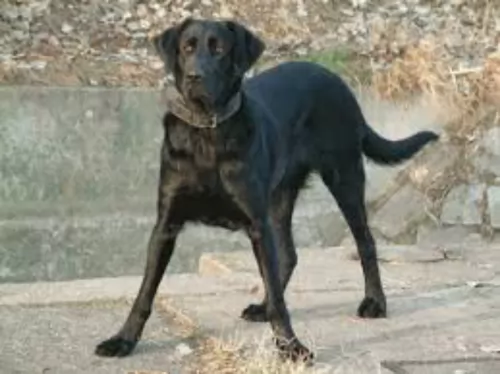 Cão de Castro Laboreiro originates from Portugal. Also known as the Portuguese Cattle Dog he was used long ago to guard livestock. Today, the modern Cao de Castro Laboreiro is descended from the molosser type dog.
Cão de Castro Laboreiro originates from Portugal. Also known as the Portuguese Cattle Dog he was used long ago to guard livestock. Today, the modern Cao de Castro Laboreiro is descended from the molosser type dog.
There are hints to the dog's origins from the 19th century, but changes in agricultural methods meant a disappearance of the dog as a livestock protector. Today the dog is mostly kept as a pet and was first seen at a dog show in 1914.
The Cão de Castro Laboreiro is recognized by the Fédération Cynologique Internationale as well as being recognized by the United Kennel Club in the United States.It is a rare dog and not many exist today but in Portugal, the USA and United Kingdom you will find a few breeders.
 Dutch breeder Leendert Saarloos began to breed German Shepherds to a European wolf. His goal was to bring out a dog that was more hard working.
Dutch breeder Leendert Saarloos began to breed German Shepherds to a European wolf. His goal was to bring out a dog that was more hard working.
The Dutch Kennel Club recognized this dog breed in 1975, and to give honor to the breeder, they gave the name to the dog - Saarloos Wolfdog. The dog was also recognized by the Federation Cynologique Internationale.
Today the Saarloos is regarded as a pet and companion. It was in 2015 that a study found that this dog showed more genetic association with the gray wolf.
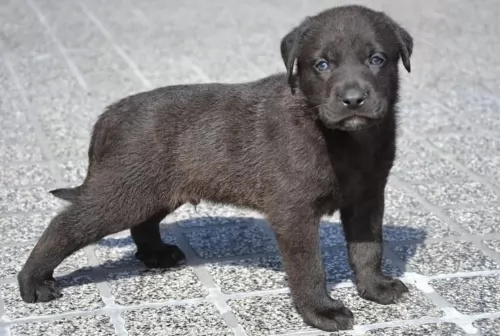 The Cão de Castro Laboreiro is a large dog, with height being in the region of 55 to 60cm and weight being in the region of 45 - 70kg. People describe the dog as wolf-like with a coat that is fairly short, thick and course. The coat is brindle with a base color of shades of grey, chestnut and black.
The Cão de Castro Laboreiro is a large dog, with height being in the region of 55 to 60cm and weight being in the region of 45 - 70kg. People describe the dog as wolf-like with a coat that is fairly short, thick and course. The coat is brindle with a base color of shades of grey, chestnut and black.
This large mastiff-type dog always has a black nose, his tail is long and carried high, but never curling over the back. He has a broad head and is much like the Labrador in looks, being free of wrinkles on the face.The ears of the Cao de Castro Laboreiro are medium-in-size and floppy while the eyes are dark brown.
The Cao de Castro Laboreiro makes an excellent pet as he forms strong bonds with his human family. He is territorial and makes an exceptional guard dog. He doesn’t particularly like strangers and is aloof around them.
This is an intelligent dog breed, he is strong-willed and stubborn, but when he is around the children in the family he is gentle and loving. When he has been trained and socialized, which is always highly recommended with every dog, he gets along with other pets in the home too.
 The Saarloos Wolfdog is a large dog standing at between 60–75cm male and female and weighing between 30 and 45kg. He is athletic and muscular with a short, dense coat. Colors are wolf-grey, white and red. The Saarloos has wolf-like expressions so the ears are erect, the muzzle pointed and the tail long and plumed. They eyes are a yellow color. The face is bright and alert, showing how intelligent he is.
The Saarloos Wolfdog is a large dog standing at between 60–75cm male and female and weighing between 30 and 45kg. He is athletic and muscular with a short, dense coat. Colors are wolf-grey, white and red. The Saarloos has wolf-like expressions so the ears are erect, the muzzle pointed and the tail long and plumed. They eyes are a yellow color. The face is bright and alert, showing how intelligent he is.
The Saarloos Wolfhound is full of energy so will be looking toward his owner to come up with good exercise for him.
A walk will always be welcome, but for such a lively dog, he’ll want something more energetic such as a hike, swimming, being allowed to run off his leash in the park and lots of vigorous ball- and rope games.
He is an independent dog and for this reason you’ll want him trained and socialized to make him obedient. He is loyal and loving but some of his wolf-like characteristics might mean that he isn’t a good choice for the first-time dog owner. If the first time dog owner is firm, consistent, strong and kind, then everything will be alright.
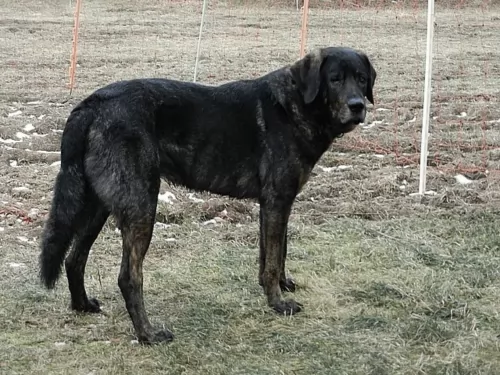 Environment and upbringing have plenty to do with how a dog turns out. People who just buy a dog for guardian purposes and nothing else can’t expect companionship in return.
Environment and upbringing have plenty to do with how a dog turns out. People who just buy a dog for guardian purposes and nothing else can’t expect companionship in return.
The Cão de Castro Laboreiro has always been a fearless guardian of livestock with his strong protective characteristics. He is intelligent and recognizes that a child in the family needs his protection.
This is a large dog who is strong, brave and intelligent but with his human family he is gentle, loving and loyal. Nonetheless he still requires a firm owner, and if you’re fair and firm with him you get the best with him. With this dog you can form a close friendship and bond.
 The Saarloos Wolfhound is a beautiful wolf-like dog that is full of life and energy. When you bring him into your life, you’re going to to have a wonderful addition to your family.
The Saarloos Wolfhound is a beautiful wolf-like dog that is full of life and energy. When you bring him into your life, you’re going to to have a wonderful addition to your family.
He is an independent dog that is strong-willed so it pays to have him trained and socialized, and then he becomes a balanced, well mannered dog that is loving and loyal with his beloved human family.
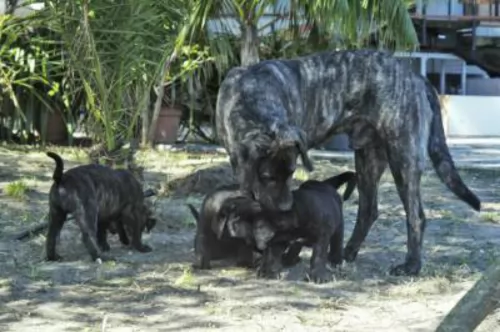 The Cão de Castro Laboreiro is generally a healthy breed, but even so, it is good to be aware of typical canine diseases that your pet may develop.
The Cão de Castro Laboreiro is generally a healthy breed, but even so, it is good to be aware of typical canine diseases that your pet may develop.
There are many eye problems that dogs have to contend with and if you see any kind of ulceration in your dogs eye, get veterinary advice.
A dog should always have access to a shady spot. Never ever leave your dog in a hot car. Heat builds up quickly and death can result soon as the body temperature rises.
Roundworm and tapeworm can infest dogs and you’ll need to speak to your vet about a worming program. Lice, mites and ticks are all parasites which attach themselves to the skin.
 A well bred Saarloos Wolfhound is regarded as very healthy, and with good care they can reach up to 12, 13, 14 or 15 years of age.
A well bred Saarloos Wolfhound is regarded as very healthy, and with good care they can reach up to 12, 13, 14 or 15 years of age.
This is a common canine disease which comes about when a dog’s hip joints don’t develop properly. For a dog diagnosed with hip dyslasia it can be painful lying down and getting around.
Hip dysplasia is a genetic condition, but diet also plays a part as well as environmental factors. All dogs breeds are susceptible to hip dysplasia. Try and avoid your dog putting on too much weight as then it puts excessive strain on the joints. There are different treatment options to make it more comfortable for your pet.
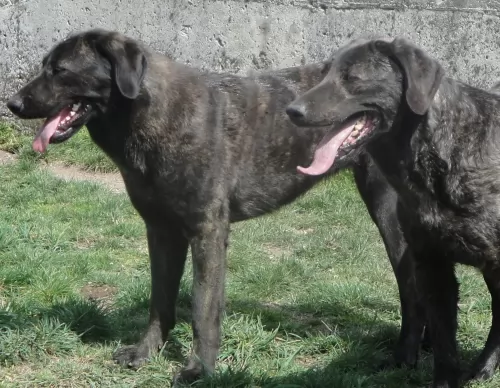 The Cao de Castro Laboreiro has a short coat which requires minimal grooming. Brushing him twice a week to rid him of loose hairs will suffice.
The Cao de Castro Laboreiro has a short coat which requires minimal grooming. Brushing him twice a week to rid him of loose hairs will suffice.
Nail clipping as well as ear- and teeth cleaning are other routine maintenance procedures for your pet.
The food you give your pet must be well-balanced and have protein and carbohydrates. If you want his skin and hair to remain healthy, vitamins, fatty acids and minerals will also be needed.
Boneless chicken and fish, brown rice and vegetables can be a good choice as well as some of the top quality commercially manufactured foods. An active dog will always need a higher protein content and therefore including raw meat into the diet is imperative – not every day as it can be very expensive, but every other day.
Remember that bones can be dangerous as they can splinter and cause your pet internal damage. Fresh, cool water must be available at all times.
 He’s an active dog so he will need a good dose of exercise to keep that muscular, lean look.
He’s an active dog so he will need a good dose of exercise to keep that muscular, lean look.
You will need to brush the dense double coat twice a week to ensure the removal of loose hairs and to keep the coat shiny and glossy. Trim his nails and check inside his mouth as he can’t tell you when he has a rotten tooth which can cause a lot of pain.
Feed puppies 4x a day.
Puppies 6 months on can have 2 meals a day.
Always feed your dog premium-quality dry food. Twice a week you can add home-made food to the dry kibble as a tasty treat. Add boiled chicken, brown rice or pasta and spinach, sweet potatoes and carrots. This food can all be chopped up and a portion added to the kibble. The rest can be frozen and then a portion warmed up for another meal.
Try and add some raw meat to his food occasionally as this helps to keep skin problems at bay.
Ensure there is always a bowl of fresh, cool water within his reach.
Your pet needs a warm, dry, comfortable place to sleep to call his own.
If your dog spends a lot of time outdoors, make sure there is both shade and sun.
Spaying and Neutering – beneficial if you don’t want puppies.
Vaccinations for puppies and adults to stave off deadly canine diseases.